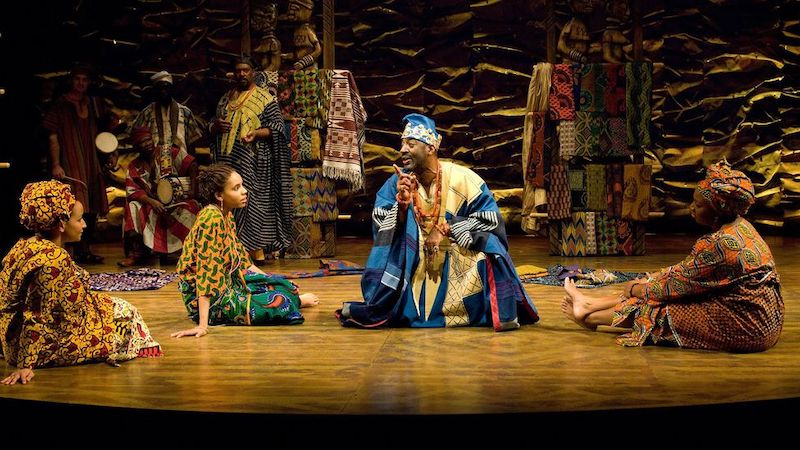
Death and the King’s Horseman
Death and the King’s Horseman. GIS production Reviewer: Ivor Agyeman-Duah
The formula for vitriolic reaction to criticism of his works and personality is for the playwright, Wole Soyinka, to do so in equal measure or beyond that if it involves the macho ethnic rangers in his country of Nigeria.
He may sometimes not read eulogising trails of his work or admiration of his stand-up opposition to non-progressive politics in Africa.
Between the literary revenge of “you slapped me yesterday and so I will slap you today,” and the avoidance of being the subject of praise season, lies the focus of Death and the King’s Horseman.
This play, which he admits in modesty is his magnus opus, is such that he has to cope with its adoration from being a text for pre-university admission to framework for graduate learning.
It goes beyond the Commonwealth of Nations to the pantheon of world classics.
Talents
The issue with talents of his type is sometimes the contestation of their own works in multiple successes.
For those whose philosophical beliefs of life after death may differ or be inclined towards politics, Death and the King’s Horseman could be in competition with Soyinka’s leadership crisis play, Kongi’s Harvest.
Which one makes for dramatic atonement in Africa’s cultural reconnaissance of itself?
And it is not just in this genre that his works compete but also in his output as a memoirist, Ake, the Years of Childhood or the last major one, You Must Set Forth at Dawn whose over 600- page text was of huge celebration.
When I was asked to do a review of it in 2007 for the International Affairs of Chatham House in London, Soyinka was in his 70s and the editor mistakenly told me its likely to be his last major work.
The Nobel laureate, Toni Morrison said she virtually read the book at one sitting.
Universality
Soyinka’s dense poetry of morbid meanings equally competes for attention among poets.
In all, however and whatever your literary preference of his creations, the unavoidable one for attention could be Death and the King’s Horseman.
It is the universality of what happens when one dies and more importantly, a king or leader in the world hereafter. It is a belief shared by many societies and those of the Abrahamic faiths.
It is the essence of this historic Yoruba story that played out in Oyo before the British colonial Administration left Nigeria.
It accounts ,therefore, for the overbearingness of Yoruba cosmology as media of conveyance.
Wherever in the world this play has been performed, it turned a hornet’s nest on a philosophical mode and a quest for an ethicist’s answer.
The reference to the play’s prevalent belief in societies included pre-colonial ones like the Asante where a similar dramatic event occurred in the late 1600s but because the British were not yet in town, it was not stopped.
The decision of an individual chief, Tweneboa Kodua to allow himself to be sacrificed so the Asantes could win war over their imperial overlords of Denkyira, forms a core spiritual resistance to domestic imperialism in the historiography of Asante. It is a belief today that its might in the nineteenth century came from among such beliefs.
Self-appraisal
The Death and the King’s Horseman also serves as Soyinka’s self-appraisal. He has directed it himself and sometimes has ideas as to what the nuances should be but does not, like all notes for production, have absolute control over its full production or adaptation by others.
Its performance effect could come from a cultural background — should the costume be Yoruba-made and should characters adopt Yoruba musical accent?
The fact that Soyinka is also an actor who as it happened, could be overwhelmingly effective as in Conor Cruise O’Brien’s, Murderous Angels of the Congo Crisis, spells out his inner intent and perspectives of how it comes out anywhere it is performed.
It was whilst in Accra and after he has completed the manuscript of his major ‘gift to Nigeria’, the satirical novel, Chronicles of the Happiest People on Earth, that the idea of this production came into discussion.
Of course, it was at a wine drinking moment and of his choice. COVID-19 had not come yet and he had planned Death and a King’s Horseman with a young Nigerian director for Lagos.
It was concluded at the end that; we would have an Accra edition and I was to liaise with Dorothy. The Nigerian caste of 40 or possibly more, were to come over for a three-day performance whose logistical nightmare we knew but were still determined.
Welcome Soyinka
COVID-19 came and inevitably the project in both locations had to be postponed. That was a year ago but it was not forgotten.
Months after, the strategy changed and in consultation with a friend and writer, the Principal of the Ghana International School, it was decided that a full student production be done and to welcome Soyinka again to the school. He had been their guest speaker at the graduating class of 2017.
This play is a classic of endurance. Few participants in this production- from the producers through to the directors and of course the caste, had been born when it was written in 1975 at Churchill College at Cambridge University. That it is part of human faith and understanding is about how classics endure.
In a way, this little production history is also inspirational- about life after the death of a project idea; perseverance and adjustments to ideals!
Ivor Agyeman-Duah is co-executive producer with Mary Ashun of Death and the King’s Horseman production by the Ghana International School from March 18-19 at the National Theatre, Accra.

